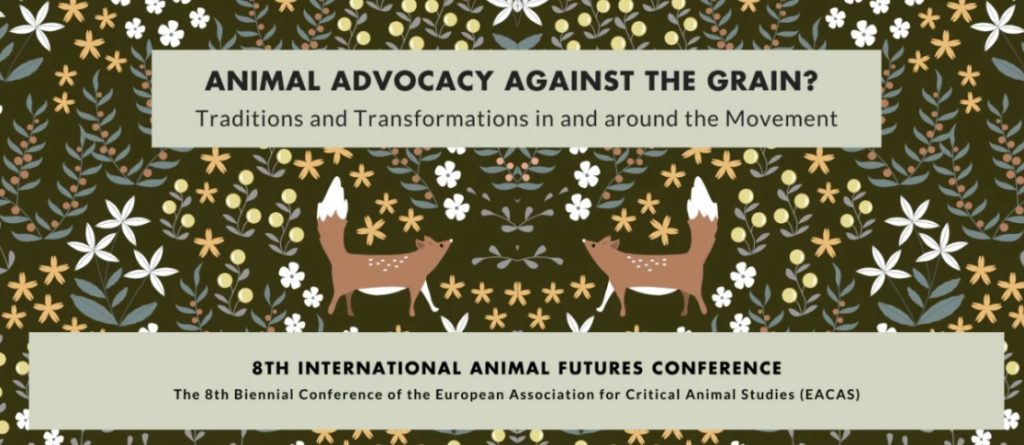Thanks to everyone who presented or attended the joint EACAS/Animal Futures conference. Many thanks also to our Estonian hosts. As soon as the talks are available online we well let you know here. Now start thinking about Berlin in 2025!
Archives
Welcome delegates!
We would love it if delegates to the joint EACAS/Animal Futures Conference this week could make a donation to any of these good causes:
- Estonian Vegan Society: https://vegan.ee/tegutse/toeta/
- Loomus: https://loomus.ee/toeta/
- The latest Vegan Land Movement Campaign: https://globalvegancrowdfunder.org/vegan-land-movement-animal-agriculture-land-buyout-2/
- Freshfields Animal Rescue: https://www.nowdonate.com/checkout/x6me81w4x35b9h4v8d5d
- Institute for Animal Happiness microsanctuary: http://www.instituteforanimalhappiness.com/donate-1
- Hugletts Wood Farm Animal Sanctuary: https://www.paypal.com/paypalme/huglettswood?fbclid=IwAR2S58El5tHo4_gPZIbBX01mkHImhxiAwLMQYSqzODvV1dbeUjAYtsBK-jw
Thank you and enjoy the conference!
One month to go – The 8th Biennial Conference of the European Association for Critical Animal Studies (EACAS) & 8th International animal futures conference. 16-18 June 2023. Please click the image below for the schedule.
Annual Meeting of the International Association of Vegan Sociologist
Title: Vegan Intersectionality
Call for Paper Deadline: June 1, 2023
Date: October 7 & 8 2023
Location: Online
Schedule: TBD
Mainstream theories of social inequality frequently compartmentalize experiences, but inequality rarely works that way in real life. Instead, individuals are comprised of many different identities at once, and these identities will interact with one another in unique ways. Furthermore, multiple systems and institutions are simultaneously at work in a given society. This schema is known as intersectionality, and it is a concept that emerges out of Black feminist thought.
In animal studies, vegan scholars employ this framework to argue that one’s life chances will be shaped, not just by one’s race, class, or gender, but also by their species. Vegan scholars also recognize the influence of an additional system….human supremacy. Historical constructions of race, class, gender, and other identities shape how animals are thought about and how they are treated. Sociologists interested in human justice, meanwhile, would benefit from recognizing how human oppression is always shaped by processes of species inequality.
Given that species, class, race, gender, and other identity categories are all historically constructed using similar mechanisms (such as animalization, objectification, sexualization, depersonalization, denaming, and so on), it is important to apply an intersectional perspective to achieve a more accurate understanding of oppression for nonhuman animals and humans alike. In the fourth annual meeting of the International Association of Vegan Sociologists, we take on this important task, one that is fundamental to vegan sociological theory.
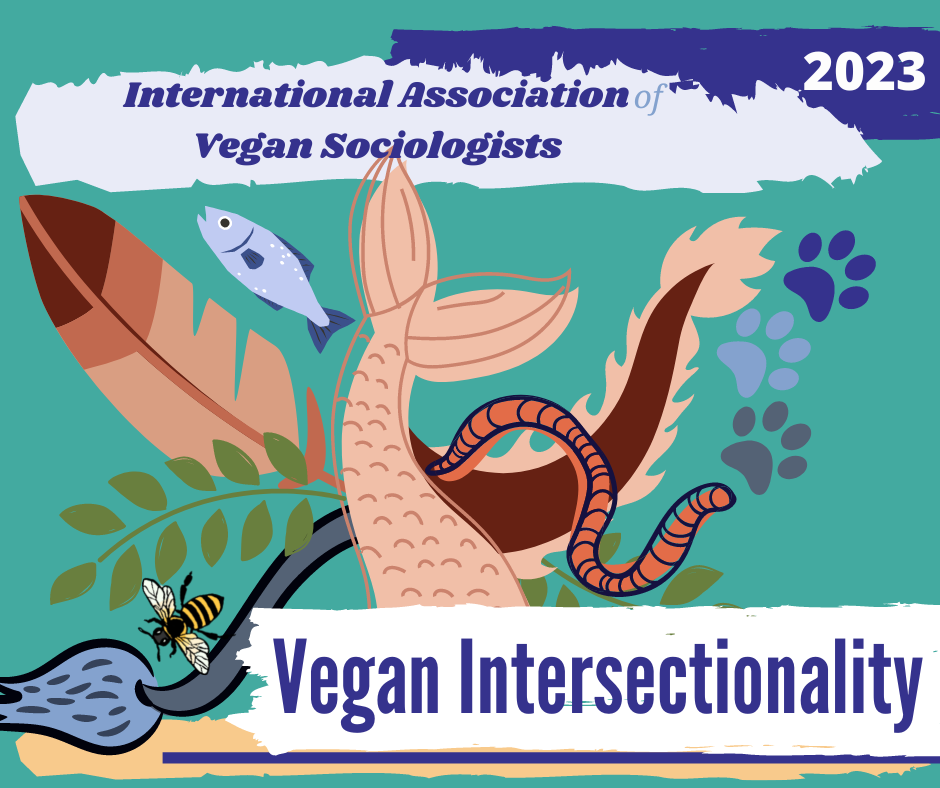
Submission Guidelines
The 2023 IAVS annual meeting will showcase research related to veganism, animal rights, and theories of intersectionality. We welcome submissions for individual presentations (15 minutes and an additional 5 for questions) or panels (45 minutes with 15 for questions) to be delivered in an online format.
Please note that all submissions should fall within the guidelines of the International Association of Vegan Sociologists. We are only accepting sociological submissions; submissions that lack a clear sociological focus will not be included. To that end, all submissions must include a one or two sentence rationale clarifying how the submission aligns with sociological theory or practice.
This online conference, organised by the International Association of Vegan Sociologists will be held online and will accommodate North American, European, and Australian time zones. Proposals and queries should be sent to info@vegansociology.com by 1st June. It is expected that all potential presenters have familiarised themselves with the principles of IAVS and plan their presentations with these in mind.
Proposal Checklist:
- Name
- Affiliation (if any)
- Preferred email
- Title of talk
- Abstract (50-300 words)
- Sociological relevance (1-2 sentences)
More info: https://www.vegansociology.com/conference/
Call for Papers – EACAS 8th Conference / Animal Futures 8th Conference
2022 Events of the Centre for Human Animal Studies
CfHAS has organised a seminar series for the year, all on zoom for your convenience. Please see the line-up, and how to register for the first talk, here https://sites.edgehill.ac.uk/cfhas/events/
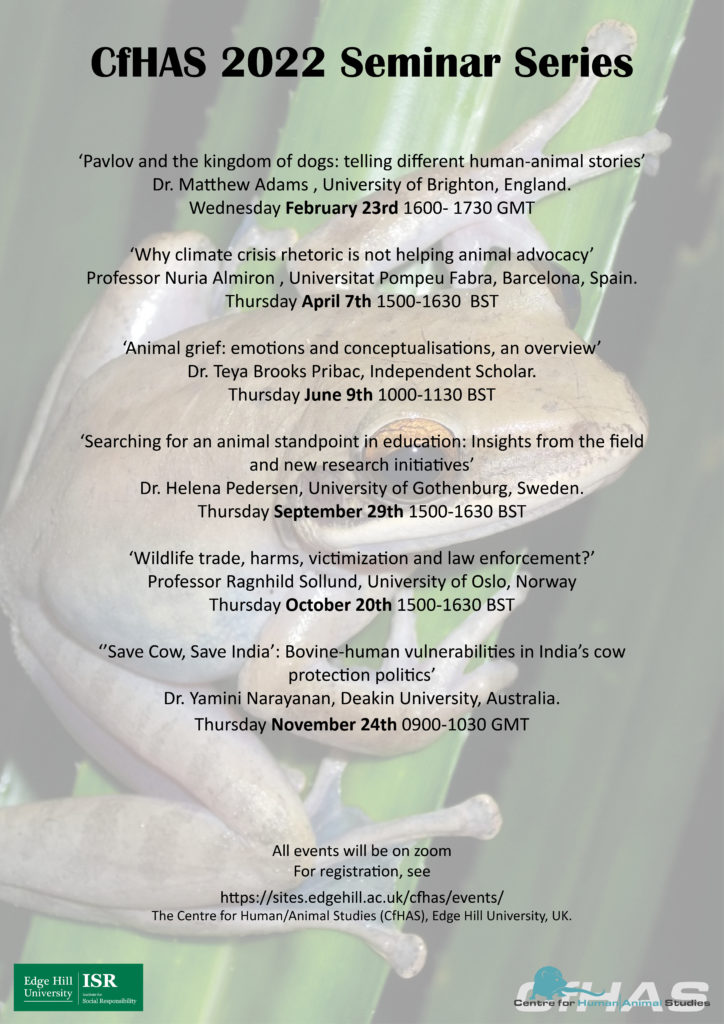
Videos from 7th EACAS Conference (2021)
We are pleased to inform you that all the presentations from the conference Appraising Critical Animal Studies (7th EACAS Conference) which took place online on 24 and 25 June 2021 are now available to view on YouTube or below:
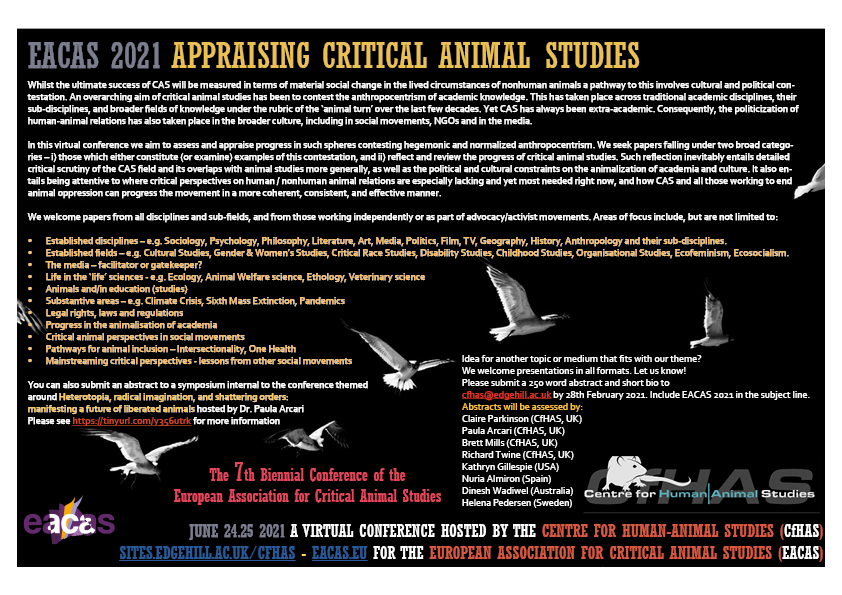
Day 1 (Thursday 24 June 2021)
09:30 – 11:00 PANEL 1 (The Covid-19 Context)
- One [is the] Problem with ‘One Health’: Anthropocentrism as a Barrier to Achieving Multi-Species Global Health in Light of COVID-19 (Donelle Gadenne)
- Absent Agents: Re-Assembling Human-Animal Relations in the Context of Covid-19 (Lena Schlegel)
- Covid as a Reckoning for Animal Advocacy: Addressing the Illegitimacy of Critical Animal Perspectives and Laying the Groundwork for Future ‘Pivotal Moments’ (Paula Arcari)
09:30 – 11:00 PANEL 2 (Activists and Activism)
- (De)Colonizing Turtle Island: Indigenous Veganism and Gender Activism (Denisa Krásná)
- Story, Strategy and Social Movement Organising (Esther Salomon)
- Using Visual Modes of Communication to Contest Normalized Anthropocentrism: An Analysis of Animal Activist Campaigns in Australia (Jane Mummery and Debbie Rodan)
09:30 – 11:00 PANEL 3 (Education and Pedagogy 1)
- CAS, Literature, and the Teachable Moment (Claudia Alonso-Recarte)
- Framing Possums: Observations of Conservation Education in Aotearoa New Zealand and the Potential for Compassionate Conservation (Emily Major)
- Building Effective Alliances: Towards an Educational Reform for Interspecies Sustainability (Maria Helena Saari)
11:30 – 13:00 PANEL 1 (Animal Human Relations)
- Animals for AI – AI for Animals (Leonie Bossert)
- Contesting Human Exceptionalism in Design Research (Michelle Westerlaken and Erik Sandelin)
- Thinking and Feeling with the Animal Archive: A Material-Semiotic Approach for Critical Animal Studies (Seth Josephson)
11:30 – 13:00 PANEL 2 – NOT RECORDED (Exploring De-Colonization / De-Domestication for Animal Liberation)
- De-Domestication Through Human Capacitation (Dorna Behdadi)
- Exploring Spaces of De-Domestication in Education (Helena Pedersen)
- The Concept of De-Domestication Through a Diffractive Reading of Decolonial Theory and Feminist New Materialism (Jonna Håkansson)
11:30 – 13:00 PANEL 3 (Knowledges)
- I Am Vegan, But I Wear Leather: A Systematic Review on Definitions of Veganism Term (Estela Díaz, Gelareh Salehi and Raquel Redondo)
- Challenging Anthropocentrism in Continental Philosophy through Animal Resistance (Lukas Leitinger)
- Animal Intimacies and Animal Liberation: Differences and Challenges in Cross-Disciplinary Work (Stephanie Eccles and Darren Chang)
14:00 – 15:00 PANEL 1 (Animals and Organisations)
- CAS and Media: Critique, Pragmatism and Advocacy (Claire Parkinson)
- Saving Animals or Saving Face? An Analysis of Animal Rights and Tourism Industry Partnerships in Promoting Ethical Animal Tourism (Jes Hooper and Carol Kline)
- A Promising Start: The Case of Critical Animal Studies in Turkey (Sezen Ergin Zengin)
14:00 – 15:00 PANEL 2 (Discourse)
- Where the Animal is Loud but CAS is Silent: A Critical Analysis of Entrenched Anthropocentrism across Contemporary Food Justice Discourse (Abi Masefield)
- NOT RECORDED: On Copies and Originals: Unpacking the Discourse of Naturalness of Animal Products (Kadri Aavik and Kuura Irni)
- NOT RECORDED: Discursive Representation of Pigs, Chickens and Cows in the Digital Edition of the Newspaper El Nuevo Día (Michelle Guzmán Rivero)
14:00 – 15:00 PANEL 3 (Art)
- Resistance Within the Museum Fauna: An Online Live Performance (EvaMarie Lindahl)
- Art After the Animal Turn (Jessica Ullrich)
- Urban Wolves in France: Literary and Artistic Zoopolis of Olivia Rosenthal and Stéphane Thidet (Paulina Szymonek)
16:00 – 17:30 PANEL 1 (Animals and/in Law)
- Animal Personhood: The Quest for Recognition (Macarena Montes Franceschini)
- NOT RECORDED Centering Animality in Law and Liberation: A Multidimensional Liberation Theory for the Zoological Revolution (Paulina Siemieniec)
- Police Brutality and the Nonhuman in the United States (Thomas Aiello)
16:00 – 17:30 PANEL 2 (Representation and Aesthetics 1)
- Who is Sallie Gardner?: Towards a Multispecies Media Studies (Brett Mills)
- Humanimal Poetics: Femininity, Animality and Pathology at the Species Border (Jessica Holmes)
- To Represent a Cow (Kristina Meiton)
16:00 – 17:30 PANEL 3 (Sociology 1)
- Animals and Society: Through the Lens of the Holy Trinity (Jennifer Rebecca Schauer and Madeleine Palmer)
- The Future of Feminist Sociology is Animal (Katja M. Guenther)
- Where are the Nonhuman Animals in the Sociology of Climate Change? (Richard Twine)
17:30 -17:45 Round-up and Poetry by Grdon Meade
20:00 – 22:00 Roundtable on CAS and Education
Featuring Dinesh Wadiwel, Vasile Stanescu & Helena Pedersen
Day 2 (Friday 25 June 2021)
09:30 – 11:00 PANEL 1 (Representation and Aesthetics 2)
- Representation, Form, Politics: What Next for Literary Animal Studies? (Dominic O’Key)
- A Critical Review of Music for Animals (Martin Ullrich)
- Animation, Animal Rights, and Social Change: Initiating Conversations on Why Animals Matter (Rajlakshmi Kanjilal)
09:30 – 11:00 PANEL 2 (Food)
- Could Yoga be a Promising Pathway for Animal Inclusion? (Jenny Mace)
- The ‘Ethically’ Consumable: Frames, Knowledge Production and Power Relations Surrounding ‘Food Animals’ in the Swedish Organic Sector (Josefin Velander)
- “I Am More than Just Food!”: What Human-Eating Monsters Can Teach Us at the Intersection of CAS and Literary Studies (Xiana Vázquez Bouzó)
09:30 – 11:00 PANEL 3 (Sociology 2)
- Readings of Marx in Critical Animal Studies: Appraising Traditions and New Directions (Chiara Stefanoni)
- Animal Appearances in Sociology: Observations on Animals in Sociological Texts from the 19th until 21st Century (Salla Tuomivaara)
- Addressing Ethical Bias of Professionals Using Animals (Tereza Vandrovcová)
11:30 – 13:00 PANEL 1 (Power)
- Towards a Holistic View of Power: Human and Non-Human Power (Michal Rotem)
- Beyond Intersectionality, Towards Interconstitutionality (Pablo Pérez Castelló)
- Bare Life Laid Bare: Human Sovereignty and Animal Abjection in the Context of the Global Coronavirus Pandemic (Zipporah Weisberg)
11:30 – 13:00 PANEL 2 (Representation and Aesthetics 3)
- Canine Tooth: Human-Canine Vulnerability and Aggression in Amores Perros (2000), Wendy & Lucy (2008) and Los Reyes (2019) (Borbála László)
- A Literary Analysis from the Perspective of the Horse in Anna Sewell’s Black Beauty: The Autobiography of a Horse (Elisabeth Kynaston)
- Animal Aesthetics and Animal Ethics: Exploring Connections (Marta Tafalla)
11:30 – 13:00 PANEL 3 (Heterotopia 1: Sites, Spaces, and Practices of ‘Undoing’)
- Vegan Vloggers’ Narratives: Heterotopias for Ending the Commodification of Animals? (David Felipe Martín García and Estela Díaz)
- Family as Sanctuary, Sanctuary as Community: Two Models of Multispecies Relations for Nonhuman Animal Liberation (Maria Martelli)
- Re-Making Domestic Natures: Multispecies Life and Care at the Sanctuary (Marie Leth-Espensen)
14:00 – 15:00 PANEL 1 (Ethics)
- Expressions of Animal Ethics: Animal Sanctuaries, the Case of Spain (Alberto José Franco-Barrera and Joaquín Fernández-Mateo)
- Animal Rights, Justice, and the Future of Food (Josh Milburn)
- Until Every Cage is Empty: Animal Liberation, Prison Abolition, and The Wages of Humanness (Vasile Stănescu)
14:00 – 15:00 PANEL 2 (Gender and Feminism)
- Middle Eastern Women’s Attitudes and Perceived Barriers of Becoming Vegan and Publicly Maintaining their Lifestyle Decisions (Gelareh Salehi and Estela Díaz)
- Animals in His-Story: How Animal Exploitation Shaped the Oppression of Men (Laura Schleifer)
- The Complicated Sex Lives of Endangered Species: Gendered Rhetoric of Giant Panda Reproduction in Captive Breeding Programs, 1985-2020 (Meg Perret)
14:00 – 15:00 PANEL 3 (Heterotopia 2: Imagining Liberated Animal Futures)
- Animal Agency, Animal Resistance (Todd C. Simmons)
- “But, What Would Happen to the Veterinary Profession?”: A Radical Imagining of the Contemporary Western Veterinary Profession Post-Animal Liberation (Donelle Gadenne)
- NOT RECORDED: What if Francis Power Cobbe Had Won?: Looking to the Past to Actualize a Future Beyond Experiments (Mitch Goldsmith)
16:00 – 17:30 PANEL 1 (Education and Pedagogy 2)
- Nonspeciesist Rhetorical Theory and Pedagogy: A Programmatic Agenda (Cristina Hanganu-Bresch)
- Teaching as Activism: Dismantling Speciesism in the Humanities Classroom (Elizabeth Tavella)
- Friends of the Jaguar: Discussing Interspecies Ethics and Post-Anthropocentric Perspectives with Children from a Brazilian Public School (Mariah Peixoto, Tânia Regina Vizachri, Luís Paulo de Carvalho and Adriana Regina Braga)
16:00 – 17:30 PANEL 2 (Representation & Aesthetics 4)
- The Interwar Period United States’ Guide Dog Movement as Enhancing and Complicating Understandings of the Human-Animal Bond: Researching and Analyzing a Case Study Representing an Intersection of Critical Animal Studies and Critical Disability Studies (Eric Deutsch)
- The Representation of Animal Activists in US Animal Advocacy Documentaries (Núria Almiron, Laura Fernández and Olatz Aranceta-Reboredo)
- Mixed Media Messages: Representation of Nonhuman Animals on Children’s TV (Lynda M. Korimboccus)
16:00 – 17:30 PANEL 3 (Heterotopia 3: Pathways to Liberated Animal Futures)
- I Couldn’t Lie Anymore So I Started to Call my Dog God (Alexandra Isfahani–Hammond)
- NOT RECORDED: Bully Goes Fishing: Prefigurative Prototyping in Ahuman Design (Erik Sandelin)
Source: Youtube Channel of the Centre for Human-Animal Studies (CfHAS)
Postgraduate Animal Studies Symposium
A two-day online training and conference event, showcasing international postgrad research students working in the field of animal studies.
Date: 24-25th May 2021
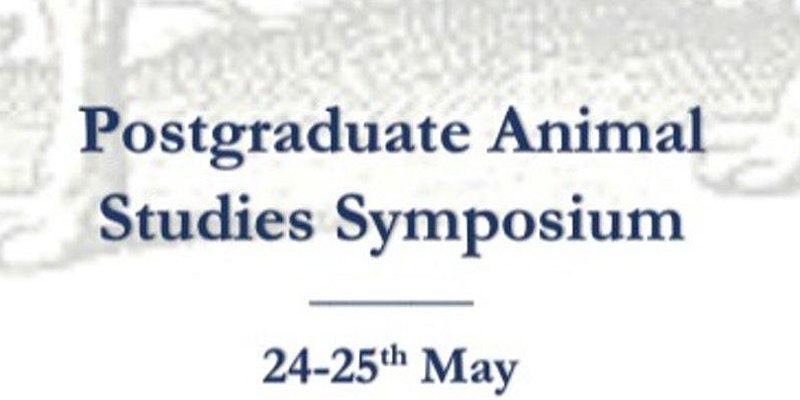
About this Event
PASS responds to a need for an animal studies knowledge exchange event which is specifically tailored to postgraduate researchers (PGRs), as existing events have tended to showcase established researchers.
We aim to forge new partnerships with animal studies communities across higher education institutions internationally, providing researchers with the opportunity to build interdisciplinary connections, and to benefit from knowledge exchange and networking. It will be the first event of its kind, free to attend and offering a programme designed specifically for the needs of PGRs.
Running over two days, PASS will feature speaker panels, five-minute thesis presentations and a plenary address by early career reseacher Dr Briony Wickes, Research Fellow in the School of English, Drama and Film at the University College Dublin.
The event, while showcasing the work of PGRs, is open to all. We warmly invite students, PGs, PGRs, ECRs, established academics and anyone else interested in animal studies, to attend. PASS provides a platform for the brilliant and innovative new research being done within the field.
Read the full programme for the symposium here, or download a PDF copy here.
CFP: SOCIAL SEMIOTICS AND THE ANIMAL OTHER (due 9 June 2021)
Call for papers for a symposium at the European Systemic Functional Linguistics Conference
Conference Date: Online 15-17 September 2021
Deadline for Submissions: 9 June 2021
Alison Moore and Daniel Lees Fryer
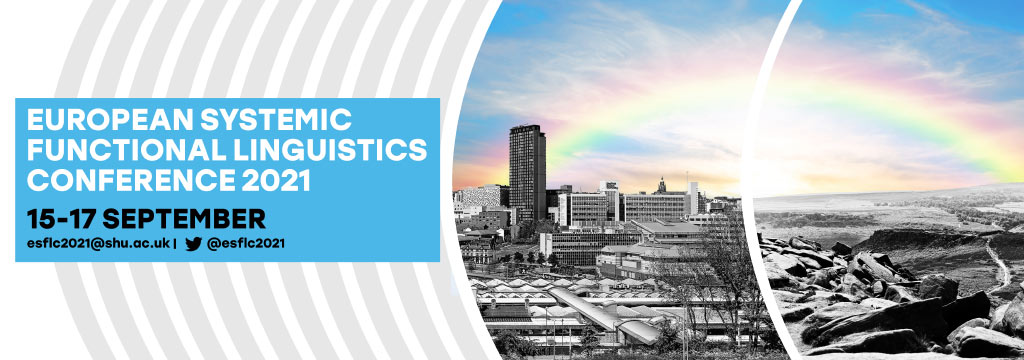
In recent years, the humanities and social sciences have witnessed an “animal turn”, an increasing interest in and centering of the lives of nonhuman animals and human-animal relations (Ritvo 2007, Pedersen 2014, inter alia), more recently situated within the context of social justice (Celermajer et al. 2021). We might expect this animal turn to have been taken up with gusto in systemic functional linguistics (SFL) and social semiotics (SFS), given their focus on language, representation, ideology and identity, but although some important work has been produced (e.g. Benson and Greaves 2005, Benson and Thibault 2009, Knight 2006), this has not yet led to a sustained subfield of SFL/SFS such as we see, for example, in educational semiotics. Inspired by the theme of ESFLC 2021 and building on the above work, we want to explore new ways that SFL and SFS can contribute to improving human-animal relations and the actual lives of individuals regardless of species, by critically addressing the statuses, roles and interests of non-human animals in society and the part that semiotic scholarship can play in understanding and acting. Our plan is to bring selected papers from the symposium together with some invited pieces to produce a special issue or edited volume.
Rationale
There is a rich history in systemic functional theory and social semiotics, as well as in related fields such as critical linguistics and critical discourse analysis, of studying language and meaning as social action (e.g. Kress and Hodge 1979, Hodge and Kress 1988, Fairclough 1992, Martin 2004). Indeed a core premise of SFL has been that the study of language, text, and context is never neutral, but rather “a mode of intervention in critical social practices” (Halliday 1993: 223-224). We note that “intervention” here includes practising linguistics or semiotics in a way that maintains the status quo, whether deliberate or not. A related theme that has energised SFL/SFS is the insistence that meaning potential is unevenly distributed across participants in a culture, usually along the lines of class, gender, ethnicity, generation, and capacity (e.g. Martin 1992: 575-576).
Nonhuman animals are participants in these cultures, too. They are our companions, our protection, our food, our entertainment, our medicine, and our (wild) imagination. Their lives, largely contingent on ours, are precarious and expendable, but their collective and individual interests are not merely subordinate to our own. While animals are probably more affected by material oppression than the symbolic oppression that helps to marginalise certain groups of humans, recent scholarship suggests we underestimate animals’ capacity – and ours – to participate together in the meaning making practices that constitute everyday multispecies life (Plumwood 1993, Celermajer 2021). But either way, our meaning making practices as humans are central to what kind of life the members of other species can live. As Thibault puts it, ”[t]he human semiotic footprint has contributed to the deeply ingrained ideological view that humans are exceptional and that other species exist to be harvested and exploited for our benefit and profit”, going on to call for humans to ‘tidy up their semiotic act’ (2020: 214). In our view, a special responsibility pertains to those who not only participate in semiotic processes but also model and teach them.
In this symposium, we invite papers that respond to the animal turn, to the animal other, or more generally to the lives of nonhuman animals from a social semiotic or systemic functional perspective. We particularly welcome proposals that seek to advance nonhuman animals’ interests (though this may be a longterm goal beyond the specific academic project). Papers can include, but need not be limited to, the following topics:
- Inter- and intraspecies communication
- Animal advocacy and/or animal liberation
- Animals and the media
- Animals and education
- Animals and medicine
- Animals and the climate predicament
- Animal agriculture
- Animal studies or critical animal studies
- Animals and nationalism
- Animals and social justice
- Glottocentrism
- Critical reflection on disciplinary theory and practice
Paper proposals
Abstracts for papers should be sent to both symposium organisers (details below) by 9 JUNE. They should follow the ESFLC 2021 guidelines and contain a short title, name(s) of presenter(s), affiliation(s), a summary of up to 250 words (excluding references), and up to five key words.
For more information, please contact the symposium organisers, or visit the ESFLC 2021 website: https://www.esflc2021.org.uk
Contact information
Alison Moore: amoore@uow.edu.au
Daniel Lees Fryer: daniel.l.fryer@hiof.no
References
Benson, James D. & William S. Greaves (eds). 2005. Functional Dimensions of Ape-Human Discourse. London: Equinox.
Benson, James D. & Paul Thibault. 2009. Language and other primate species. In Halliday, M.A.K. and Jonathan Webster (Eds) Continuum companion to Systemic Functional Linguistics, 104-112. London: Continuum.
Celermajer, Danielle, Schlossberg, David, Rickards, Lauren, et al. 2021. “Multispecies justice: theories, challenges, and a research agenda for environmental politics.” Environmental Politics 30: 119-140.
Fairclough, Norman. 1992. Discourse and social change. Cambridge: Polity Press.
Halliday, M. A. K. 2003 [1993]. “Language in a changing world.” In Volume 3 in the collected works of M. A. K. Halliday. On language and linguistics, edited by Jonathan J. Webster, 213-231. London: Continuum.
Hodge, Robert, and Gunther Kress. 1988. Social semiotics. Cambridge: Polity Press.
Knight, Naomi. 2006. Appraisal in bonobo-human culture: negotiating social behavioural parameters through evaluation with bonobo apes. Linguistics & the Human Sciences 2:355-376.
Kress, Gunther, and Robert Hodge. 1979. Language as ideology. London: Routledge & Kegan Paul.
Martin, J. R. 1992. English text: system and structure. Amsterdam: John Benjamins.
Martin, J. R. 2004. “Positive Discourse Analysis: Power, solidarity and change.” Revista canaria de estudios Ingleses 49: 179-202.
Moore, Alison Rotha. 2014. “That could be me: Identity and identification in discourses about food, meat, and animal welfare.” Linguistics & the Human Sciences 9: 59-93. Special Issue on Identity, edited by Alexanne Don.
Pedersen, Helena. 2014. “Knowledge production in the “animal turn”: multiplying the image of thought, empathy, and justice.” In Exploring the animal turn: human-animal relations in science, society and culture, edited by Erika Andersson Cederholm, Amelie Björck, Kristina Jennbert and Ann-Sofie Lönngren, 13-18. Lund: Pufendorf Institute for Advanced Studies.
Plumwood, Val. 1993. Feminism and the Mastery of Nature. New York: Routledge, 1993.
Ritvo, Harriet. 2007. “On the animal turn.” Daedalus 136 (4): 118-122.
Thibault, P. (2020) ”Interspecies relationality in the Animal Rescue genre: Multimodal resources for empathy construction in video texts.” Section E in Baldry, A. & Thibault, P. with Coccetta, F., Kantz, D. & Taibi, D. ”Multimodal Ecological Literacy: Animal and human interactions in the Animal Rescue genre.” In Vasta, A. and Baldry, A. (eds). Multiliteracy advances and multimodal challenges in ELT environments. Udine: Forum.
EACAS 2021 June 24-25th – ‘Appraising Critical Animal Studies’ -Call for Papers
Whilst the ultimate success of CAS will be measured in terms of material social change in the lived circumstances of nonhuman animals a pathway to this involves cultural and political contestation. An overarching aim of critical animal studies has been to contest the anthropocentrism of academic knowledge. This has taken place across traditional academic disciplines, their sub-disciplines, and broader fields of knowledge under the rubric of the ‘animal turn’ over the last few decades. Yet CAS has always been extra-academic. Consequently, the politicization of human-animal relations has also taken place in the broader culture, including in social movements, NGOs and in the media.In this virtual conference we aim to assess and appraise progress in such spheres contesting hegemonic and normalized anthropocentrism.
We seek papers falling under two broad categories – i) those which either constitute (or examine) examples of this disciplinary contestation, and ii) reflect and review the progress of critical animal studies. Such reflection inevitably entails detailed critical scrutiny of the CAS field and its overlaps with animal studies more generally, as well as the political and cultural constraints on the animalization of academia and culture. It also entails being attentive to where critical perspectives on human / nonhuman animal relations are especially lacking and yet most needed right now, and how CAS and all those working to end animal oppression can progress the movement in a more coherent, consistent, and effective manner.We welcome papers from all disciplines and sub-fields, and from those working independently or as part of advocacy/activist movements.
Areas of focus include, but are not limited to:
Established disciplines – e.g. Sociology, Psychology, Criminology, Philosophy, Literature, Art, Media, Politics, Film, TV, Geography, History, Anthropology and their sub-disciplines.
Established fields – e.g. Cultural Studies, Gender & Women’s Studies, Critical Race Studies, Disability Studies, Childhood Studies, Organisational Studies, Ecofeminism, Ecosocialism.
The media – facilitator or gatekeeper?
Life in the ‘life’ sciences – e.g. Ecology, Animal Welfare science, Ethology, Veterinary science
Animals and/in education (studies)
Substantive areas – e.g. Climate Crisis, Sixth Mass Extinction, Pandemics
Legal rights, laws and regulations
Progress in the animalisation of academia
Critical animal perspectives in social movements
Pathways for animal inclusion – Intersectionality, One Health
Mainstreaming critical perspectives – lessons from other social movements
You can also submit an abstract to a symposium internal to the conference themedaround Heterotopia, radical imagination, and shattering orders:manifesting a future of liberated animals hosted by Dr. Paula Arcari. Please see https://tinyurl.com/y356utrk for more information
Idea for another topic or medium that fits with our theme? We welcome presentations in all formats. Let us know!
Please submit a 250-word abstract and short bio to cfhas@edgehill.ac.uk by 28th February 2021. Include ‘EACAS 2021’ in the subject line.
Abstracts will be assessed by: Claire Parkinson (CfHAS, UK), Paula Arcari (CfHAS, UK), Brett Mills (CfHAS, UK), Richard Twine (CfHAS, UK), Kathryn Gillespie (USA), Nuria Almiron (Spain), Helena Pedersen (Sweden) and Dinesh Wadiwel (Australia).

